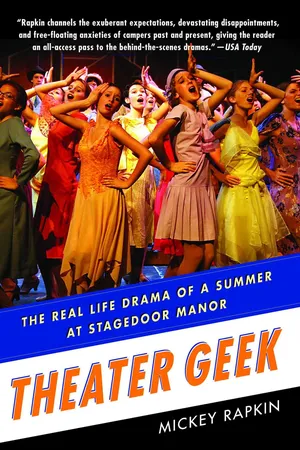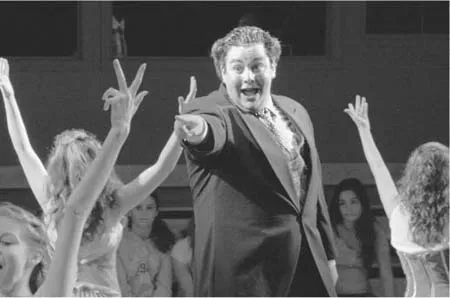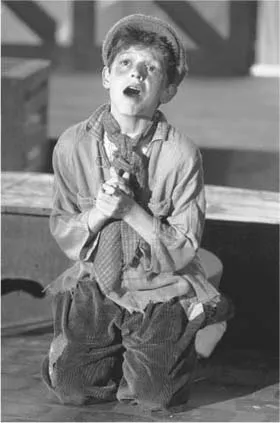![]()
CHAPTER 1
It’s Showtime
IN THE COZY LOBBY OF WHAT WAS ONCE A CATSKILLS HOTEL, nearly three hundred children sit, crammed in and anxious. It is day three at Stagedoor Manor, and in just a moment these campers will learn which roles they’ll play in one of the thirteen shows to be produced in the next three weeks. And the wait—the interminable wait!—will be over.
The vibe in the wood-paneled room is tense, the subtext of every conversation: God, I hope I get it. Campers flit about. Some sing aloud to themselves as they walk. The kids refer to this unconscious vocal expression as “singing Tourette’s,” acknowledging that while the humming is certainly annoying, no one in this situation could reasonably be expected to control the sound any more than someone suffering from Tourette’s syndrome could be expected to silence his outbursts. When theater geeks get anxious they also tap-dance. The actor Sebastian Stan (Gossip Girl) was a camper here not too long ago. He describes that moment when the cast lists go up. “It’s nerve-racking,” he says. “It’s that same nervous adrenaline you find later in life after a professional audition, when you’re waiting for that miracle phone call.”
Stagedoor Manor campers have been known to cry on these mornings—both tears of joy and those born from seemingly life-ending disappointment. The musical’s the thing. But not everyone can be cast in that session’s hot show. “At Stagedoor, I was cast in The Utter Glory of Morrissey Hall,” says Mandy Moore. “I think it was produced on Broadway once. It closed during intermission.” (Actually, The Utter Glory of Morrissey Hall—a musical about a British headmistress, so popular at Stagedoor because it has an abundance of female roles—played seven previews and one performance on Broadway in 1979 before abruptly shuttering.)
The big show this session is still a secret. All thirteen titles are. And for three days these would-be thespians speculate, needle, debate. In an effort to rustle up some information on the still top-secret program, they badger the weaker staff members, pleading: “Just tell me what show you’re directing.” In fact, the anticipation was so terrible in 2009 that the night before the shows were revealed the entire camp was shipped off to the Middletown Mall to the movies. The off-grounds escape was meant to distract from the anxiety—How many people does he need?—not that it helped. “We talked about the shows the entire bus ride,” says Rachael Singer, eighteen, who was beginning her final summer at Stagedoor. Over breakfast, on the morning the cast lists were to be posted, Rachael sat in the back of the cafeteria plainly nervous, mindlessly twisting a black hair tie in her hand and barely touching her food. If her friend Harry Katzman was similarly anxious, you wouldn’t have known it by looking at his plate. It was licked clean.
Harry Katzman, eighteen, has dark curly hair, the ample physique of Zero Mostel, and the nearly translucent complexion of someone who spends an awful lot of time indoors. Two days earlier, walking into the lobby on the first day of camp, he was dressed in a striped T-shirt and pale blue jeans rolled up to the calf. He entered the space like Eva Perón in Evita, beckoning the peasants to him. Small girls approached Harry. Former co-stars and assorted hangers-on wrapped their arms around his body and hugged him tightly.
Harry is something of a celebrity at Stagedoor Manor—a teenager renowned for his rich voice, his good humor, and his always-reliable gossip. Justin Mendoza, one of the camp’s music directors (he studied at the University of California–Irvine and spent three years as the associate music director at San Francisco’s famous revue Beach Blanket Babylon), remembers meeting Harry in 2006. “Harry used to come up to me, grab my hand, and interlock our fingers,” Justin says. “Then he’d want to gossip.” Never shy, Harry fancied himself a musical theater expert—the cast albums on his iPod are sorted by West End versus Broadway company—and he thought nothing of handing out his unsolicited opinions to the camp’s artistic staff. In 2006, Stage-door’s Raymond Zilberberg directed a production of Company, Stephen Sondheim’s musical about open marriages and a lonely bachelor. As rehearsals began, Harry pulled the director aside and offered to lend him a DVD of the celebrated 1996 Donmar Warehouse production of Company, which Harry said had “some ideas I could borrow,” Raymond recalls, shaking his head in loving disbelief.
Harry rarely keeps his thoughts to himself. On the first day of his first summer at Stagedoor Manor, Harry joined a conversation of returning campers who were busy discussing their audition songs. The boy to Harry’s left said he was planning to sing “Dancing Through Life,” from Wicked.
“I made a face,” Harry admits. “I was such a jerk.” For his part, Harry sang “Luck Be a Lady,” from Guys & Dolls. Not exactly an inspired choice, he admits now. “But at least it was traditional!” If Harry came across, shall we say, strong, that summer, he had an excuse: “I was among my people for the first time.”
Harry comes to Stagedoor from Columbia, South Carolina. And he is, in many ways, the archetypal Stagedoor theater geek—a smalltown boy with an expressive personality who loves theater and finds a second home in Loch Sheldrake. Harry’s mother, Debbie Katzman, does not mince words. “Stagedoor was Harry’s savior,” she says, preferring to leave it at that.
Harry wasn’t always a star at camp. He’d turned in reputable performances before, notably as Thénardier in a 2006 production of Les Misérables. In a 2007 staging of Grand Hotel, Harry played Hermann Preysing, manager of a struggling textile mill who commits rape in act two. Harry’s onstage verisimilitude was frightening. “He creeped us out!” says Konnie, the camp’s production director and associate producer. Harry agrees with her assessment of his very fine work in Grand Hotel. After that show, he says, “people would legit not talk to me.”
But nothing prepared the camp for Harry’s turn as the Chairman in 2008’s The Mystery of Edwin Drood. This lesser-known musical—not seen on Broadway since 1985—is a comedy of mistaken identities and murder, and the role of the Chairman is crucial to any production’s success. First, it’s the Chairman’s responsibility to set the tone for the evening, encouraging the audience to be (as the script indicates) as “vulgar and uncivilized as legally possible.” But the actor must also memorize reams of dialogue, not to mention craft an entirely separate role for the second act’s play within a play. Yet, in a cast of Stagedoor Manor superstars, Harry put Drood in his back pocket and walked away with it. When he commanded, the audience laughed. Yet with a quick turn of his hand, he could inspire dead quiet. He pulled this performance off in three weeks—from a standing start? Dang, kid.
After The Mystery of Edwin Drood, Nancy Carson, a well-known New York talent agent who regularly scouts at Stagedoor, approached Harry. So did a rep from the talent agency Paradigm. “I got carded for the first time,” Harry says. Business cards, he means. As in “Stay in touch, kid. Let’s work together.” “It was flattering,” Harry says, but also frustrating. “Nothing came of it. I live in South Carolina. I couldn’t afford to fly to New York for auditions.”
Harry Katzman played The Chairman in 2008’s The Mystery of Edwin Drood. Harry spent a lot of time at the pool that session—not swimming, but rather studying his lines.
This display (otherwise thrilling) was another reminder of how geographically undesirable Harry was. There’s not a lot going on for aspiring actors in Columbia, South Carolina, after all. During the winter months, Harry would sit up late at night—on e-mail, on iChat—living his life through a computer screen. He’d listen to stories from his Stagedoor friends, many of whom lived close to Manhattan, who were already auditioning for professional work. One of Harry’s friends (spotted at Stagedoor by an agent) was up for the Meryl Streep film It’s Complicated and then for the 2009 Broadway-bound revival of Brighton Beach Memoirs. Another Stagedoor contemporary, Aaron Albert (who’d understudied the lead in the musical 13 at the Mark Taper Forum in Los Angeles in 2007), auditioned for Brighton Beach Memoirs but didn’t get the part, either. In the end, that role went to yet a third Stagedoor Manor camper, Noah Robbins, a phenom who’s been dancing with Debbie Allen since he was six years old. Harry, at home in South Carolina, didn’t begrudge his friends their success. But at times, listening to their industry talk left him frustrated and feeling further isolated.
There wasn’t a soul in Columbia who didn’t know Harry wanted to go to the University of Michigan. Harry had made that much perfectly clear. In recent years, under department chairman Brent Wagner, Michigan’s musical theater program had become arguably the best in the country. Recent Michigan alums include Gavin Creel (a Tony nominee for the 2009 revival of Hair), Alexander Gemignani (Valjean in the recent Broadway revival of Les Misérables), and Celia Keenan-Bolger (The 25th Annual Putnam County Spelling Bee). Admission to Michigan’s program is a near impossibility: six hundred students apply annually for twenty spots. Undeterred, in his senior year of high school Harry flew to Ann Arbor with his mom for the audition, which included two songs, a monologue, and a dance combination. “I don’t dance,” Harry admits. “I fance. I’m a fancer. I fake dance.” Really? “I’m terrified of dancers,” he says. “They can kick their face!” Still, Harry smiled through the choreographed portion of the morning, making his way across the stage, hoping some well-played jazz hands might distract the committee from his two left feet.
Eighty people auditioned for Michigan that day. Of those eighty, Harry Katzman was the only one accepted.
And yet.
Harry reflects on careerism and on a curious sentiment bubbling up among his peers—a generation reared on Hannah Montana and American Idol. “I feel like I may have missed out,” Harry says. “These thoughts go through my head. Why don’t people know me yet? Why don’t I have an agent? Maybe I could have been on a Nickelodeon show. I’ve never had stage parents to make it happen. I’m doing this on my own.” Brian Muller, eighteen, is something of an anomaly at Stagedoor Manor. For one thing, his iPod is more Jay-Z than (Tony nominee) Jayne Houdyshell. Also, he’s athletic.
Nearly six feet tall, with good hair and good teeth, Brian grew up on the Upper West Side, and he possesses that particular air of bravado that only comes from a childhood spent treating Manhattan as your own backyard. During his first summer at Stagedoor Manor, when Brian was eleven years old, he spotted a bunch of the older boys playing basketball on the camp’s one-rim half-court. Brian ran at a clip to join them. But he was disappointed to find, upon closer inspection, that this was an ironic contest. “They were playing basketball,” Brian says, “but as a joke. Like, Ha ha, Stagedoor kids playing sports.” Brian grabbed the ball and shot a few from outside the key. He didn’t make a single basket. “But at least I hit the rim,” Brian says. “The other kids looked at me and were, like”—accusatorily—“‘Why are you good at basketball?’”
There’s a famous scene in A Chorus Line where a young man steps forward to explain how he first started dancing. He says it began when he followed his sister to class one day. “I’m watchin’ Sis go pitterpat,” he sings. “Said, I can do that, I can do that.” That, in a lyric, is how Brian Muller wound up at Stagedoor Manor. Visiting his sister at camp years ago, he’d stumbled into the Stagedoor lobby, his eyes suddenly immense. He then spent the next ten months pleading with his parents to send him to theater camp. The Mullers were, to say the least, surprised by their son’s sudden interest in the arts. At that young age the only thing Brian ever wanted to be was a professional golfer. Brian’s father worked in the kitchen design business and certainly never expected this from his son. “My dad wasn’t listening to Patti LuPone records at night,” Brian says. Brian’s childhood friends were, likewise, somewhat alarmed. “We all went to sports camp,” says his classmate Billy Greene. “We thought theater camp was weird.”
Brian Muller stars in a 2004 production of Oliver!, playing the famously hungry orphan. Years later. Brian will reflect: “Why could I do a better cockney accent when I was eleven than I can now?”
Weird or not, the Mullers consented, enrolling their son for one three-week session in the summer of 2002. That was all it took. Brian fell in love with the place and, really, with the discipline of acting. And what started as a silly summertime adventure somehow snowballed into something more vocational. At twelve or thirteen, an agent picked Brian out of a Stagedoor rehearsal. She wanted to see him in New York when camp let out. But the Mullers hesitated. “What did we know about agents?” says Brian’s mother, Nancy, now a communications officer at Bank of America. The Mullers waited to call longer than most parents of aspiring young actors would have. Finally they went to see this woman in her Manhattan office, where she asked Brian to sing a song and read a scene. “We can take this as slow as you want, or as quickly as you want,” the agent told Brian’s parents.
And so it began. Brian went on an audition for a Tostitos commercial, the one about kids at a slumber party. (“Shhh! Get the Tostitos,” Brian had to say.) He went out for an independent film where he’d play identical twin brothers, one of whom gets killed in a fire. No luck there, though he did land a role in the workshop of a new musical, Pages, the story of a thirteen-year-old aspiring pornographer. What does Brian remember about that period in his life? The casting directors? The waiting rooms? The rejection? No. “When I smile,” Brian says, “my left eye is smaller than my right. So in my first head shots, it looked like I had a lazy eye.”
Brian returned to Stagedoor Manor every summer since that first and found his niche despite being something of a minority, both in athletic ability and attitude toward the dramatic. For example, in 2008, he starred in a Stagedoor Manor production of the southern drama Dark of the Moon, a sort of backwoods Romeo and Juliet about a girl in love with a witch-boy. In a beautifully affecting final scene, Brian cradled his co-star, Morgaine Gooding-Silverwood, in his arms as she lay dying. Unfortunately, when he laid her down, he placed her too close to the footlights, and her dress started to smoke. Midscene, the actress cracked one eye and whispered: “Am I on fire?”
“Yes,” Brian replied stomping out the flames with his fist, before finishing the scene, to wild applause. Meanwhile, his co-star, a wonderfully talented actress, was inconsolable. “I was angry with myself for breaking character,” she said.
“You were on fire!” Brian shouted in response.
Despite years of acting at home and at camp, when it came time to apply to college, Brian’s mother Nancy was surprised her son homed in on Bachelor of Fine Arts programs. “As a kid, he’d leave an audition,” she says, “and I’d ask him, ‘How did it go?’ He’d mumble, ‘It was fine.’ And that was it.” Was it inertia carrying her even-tempered son through? “I mean, a BFA?” she asks. “What is that?” Brian’s father convinced her that their son should at least apply to these programs. Though he probably wished his boy had chosen a more stable profession, “he’s excited that I have a path,” Brian says.
Brian’s friends, that athletic bunch from Manhattan’s Trevor Day School who’d initially deemed theater camp “weird,” were likewise now on board. “I think Brian’s agent used to work with Britney Spears,” Billy says. “That’s legit!” And they’ve come to embrace their friend’s potential stardom. They even have a nickname for him: Vince. “Like on Entourage,” Brian says, smirking. On that HBO series, Vince is the big Hollywood stud and a true ladykiller. It’s not exactly a stretch. At Stagedoor in 2009, there was a teenage girl who admitted that the only reason she was there for session one was that Brian was coming for session one. The girl switched her own plans, she says, “for the chance to kiss Brian.” (Except she didn’t say “kiss.”)
In the spring of his senior year, Brian was accepted into the prestigious acting program at Carnegie Mellon University. And he immediately took on the lax attitude of a high school senior with the next four years locked up. “I was going to Carnegie Mellon,” Brian says. “I thought, It’s senior year and I can chill out. I’ll go to college and it’ll be awesome.”
But in the same way that fate intervened when Brian, a ten-year-old aspiring golfer, stumbled into the Stagedoor lobby to visit his sister, once again some larger force would give Brian a nudge. It was around the time that his acceptance letter to Carnegie Mellon showed up that Brian auditioned for the national tour of Little House on the Prairie, a new musical starring Melissa Gilbert. A dance audition and a subsequent callback followed for Brian; and then a waiting game.
One spring night, he came home to find his parents and his sister seated at the kitchen table. Brian’s father looked angry. “Did you leave my bedroom door open?” he asked. “Becau...


